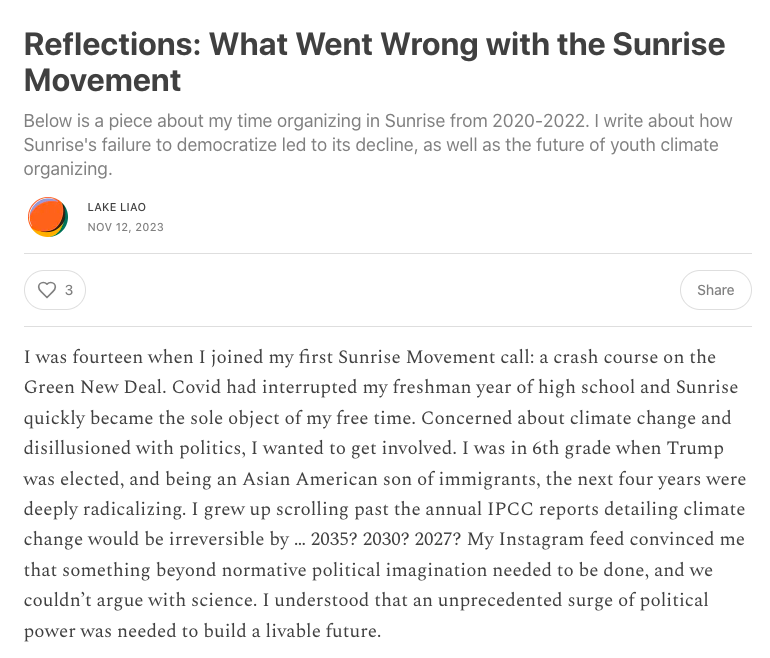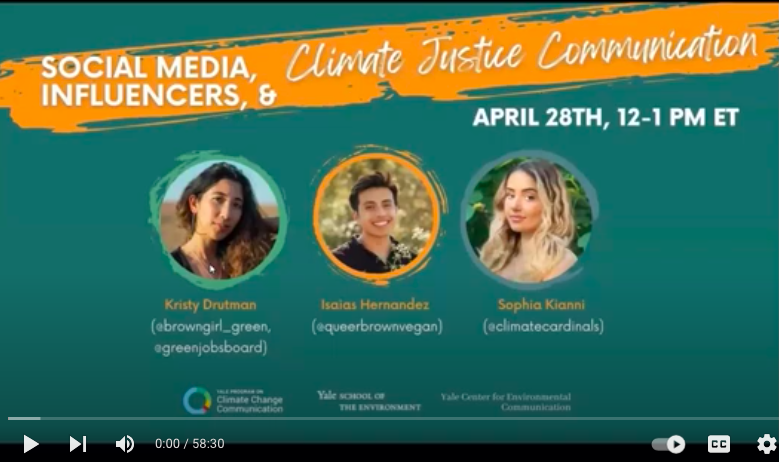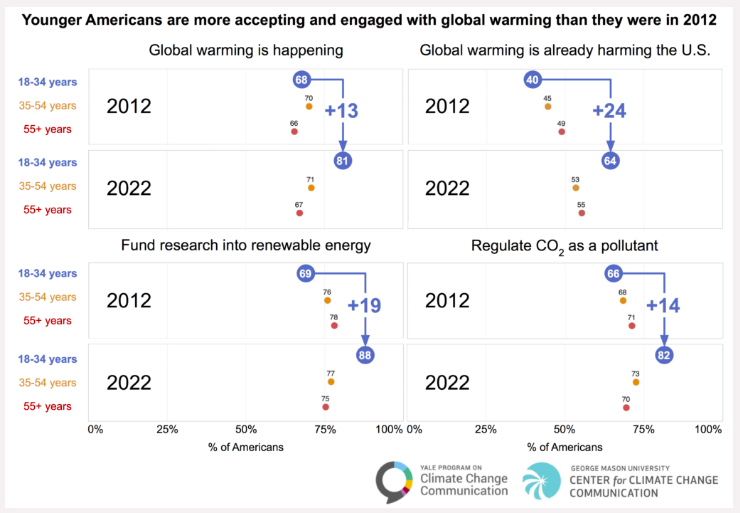Resources
Search below for resources covering the intersection of climate engagement, social science and data analytics.
RESULTS
Reflections: What Went Wrong with the Sunrise Movement
The Sunrise Movement has had successes but also experienced internal difficulties. This article, a personal reflection on Sunrise experience, argues that the energy and mobilization of the 2018-2020 years that led to a surge of youth joining the Sunrise Movement won’t be possible in the next four years unless a new organizational strategy is built in the youth climate left. This author organized with a local Sunrise “hub” and then joined national leadership teams. However, Sunrise internal politics were based on who you knew.
How climate activists won the American Climate Corps
Last month, President Joe Biden announced the launch of the American Climate Corps, or ACC — a program that will train some 20,000 young people in careers in climate and clean energy. In this resource, Sunrise Movement co-founder Evan Weber discusses the years of Green New Deal organizing that led to the landmark new jobs program to address the climate crisis. A broad paint brush of tactics contributed to the win that is the American Climate Corps. These tactics included 500 young people getting arrested for blocking the White House in the summer of 2021 while demanding a fully-funded civilian climate corps in the Build Back Better negotiations. They also included behind-the-scenes lobbying and policy negotiation, coalition building and the electoral work that delivered some of the highest youth voter turnout in modern history — with climate being the reason that happened. The latter is also the reason President Biden went more aggressive on climate and updated his climate policy.
Climate and the environment are top issues for young Americans in the 2024 elections. When asked to pick a maximum of three important issues that will inform their vote ahead of next year, a quarter of young Americans say health care is top of mind, closely followed by the economy and housing affordability at 24%. Along with issues related to reproductive rights (23%), climate change (21%), and gun violence (20%).
Young Women Voters Are More Liberal Than Young Men, Change Research Poll Finds
Young voters are pessimistic about everything from the economy to the direction the country is headed to their ability to handle an unexpected $1,000 expense. Beyond that, they don’t think politicians keep their promises. They blame the Supreme Court for blocking President Biden’s loan forgiveness plan and worry about being able to afford groceries. There is a striking gender divide in topics such as how young people identify politically (men see themselves as more conservative while women, trans, nonbinary, and gender-nonconforming people are more liberal) and the podcasts they listen to (men are inclined to listen to The Joe Rogan Experience and The Ben Shapiro Show, while women are bigger fans of This American Life and The Daily). 41% percent of women surveyed identify as politically progressive; only 24% of men do. Meanwhile, 23% of women consider themselves to be liberal, while only 15% of men feel the same; 18% of the men surveyed count themselves as conservative, compared with only 11% of women. 11% percent of men say they are most aligned with “MAGA,” or Donald Trump’s brand of politics, while only 3% of women do.
How to incorporate climate justice in the language classroom
Language teachers have a key role in ensuring that students not only engage with the climate crisis but with climate justice too. Developing students’ understanding of these cause-and-effect connections that affect people around the world is just one of the aspects to focus on the language classroom to raise awareness of climate justice. To engage students and teach them the importance of cross-disciplinary collaborations, consider teaming up with other teachers for projects and involve students in decision making as much as possible.
Social Media, Influencers, and Climate Justice Communication
Leading eco-influencers are harnessing online platforms for education and social change around environmental, climate, and justice issues. Kristy Drutman of Browngirl Green and Green Jobs Board is working to improve the anti-racist practices of environmental organizations and publicly speaks on climate justice. Isaias Hernandez of QueerBrownVegan creates online educational climate content and collaborates with writers, communicators and researchers. Sophia Kianni of Climate Cardinals is working to make the climate movement more accessible by translating and sourcing crucial climate resources into more than 100 languages.
Today’s young people experience the impact of climate change on their communities every day, both at their doorsteps and in the media they consume. Global headlines have increasingly used the term “eco-anxiety” to describe a generalized fear of environmental doom. Yet few are telling the story of the optimism and action that define how young people want to deal with it. This survey found that more than half of these youth across the globe (57%) experience eco-anxiety. However, they aren’t letting their anxiety spiral into despair, or worse, apathy. Instead, threats of climate change drive their resilience, optimism and activism. Though this resilient mindset is positive, a gap remains between young people in this survey who identify as eco-optimists and eco-realists (a combined 66%) and those taking direct action in their own communities (just 16%). For those working to counter and mitigate the effects of climate change, it is clear we need to do more to foster agency among young people and create direct opportunities for young people to participate in and drive climate solutions. This research surveyed youth in many countries around the world.
Youth and LGBTQ+ in Nonviolent Action: The WiRe+ Data Set
This dataset expands the original Women in Resistance (WiRe) dataset to provide a globally comprehensive data source on youth and LGBTQ+ participation in 209 maximalist nonviolent campaigns (those that pursue regime change, secession or newly autonomous states) from 1990-2020. The data is collected at the campaign level, and include several indicators for both youth and LGBTQ+ participation. The main measures are: Youth and LGBTQ+ frontline participation in movements; Youth and LGBTQ+ organizational presence; and Youth and LGBTQ+ presence in campaign leadership.
Younger Americans are growing more worried about global warming
Since 2012, global warming acceptance and worry have increased faster among younger Americans aged 18-34 compared to older Americans. More young adults today accept that global warming is happening (+13% points from 68% in 2012 to 81% in 2022) and already harming the U.S. (+24% from 40% in 2012 to 64% in 2022). Further, conservative Republicans consistently remain the least worried—the gap in worry about global warming between liberal/moderate and conservative Republicans has grown by 7% points in the last decade (from a difference of 32% points in 2012 to 39% points in 2022) and 12% points in the last five years (from a difference of 27% points in 2012 to 39% points in 2022). There is also increased political polarization in climate policy support over the last five years—conservative Republicans are much less supportive of funding research into renewable energy today (52% in 2022) than they were in five years ago (71% in 2017), and the difference in support between liberal/moderate and conservative Republicans has grown by 10% points (from a difference of 15% points in 2017 to 25% points in 2022). These findings and more come from the latest release of Climate Change in the American Mind (CCAM) data and the update to interactive data visualization tool, the CCAM Explorer. The data and tool include two additional years of public opinion about climate change (2008-2022) and enable anyone to explore Americans’ beliefs, risk perceptions, policy support, and behaviors over time and by different demographic groups.
Younger evangelicals in the U.S. are more concerned than their elders about climate change
In the US, adults under 40 are considerably more likely than their elders to express concern about the issue and attribute it to human activity. Overall, two-thirds of U.S. younger adults say global climate change is an extremely or very serious problem, compared with roughly half of those ages 40 and older (52%), according to a recent Pew Research Center survey. There are similar age gaps among evangelical Protestants, even though both younger and older evangelicals are less likely than Americans overall to express concern about climate change. Evangelical Protestants under 40 are more likely than older evangelicals to say climate change is an extremely or very serious problem (41% vs. 31%). And 42% of evangelical adults under 40 say the Earth is warming due to human activity, compared with 28% of evangelicals ages 40 and older. However, just 5% of U.S. adults under 40 are both highly religious and concerned about climate change, compared with 9% of those ages 40 and older.
Pagination
- Previous page
- Page 2
- Next page









